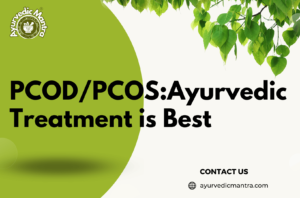
PCOD/PCOS: Ayurvedic Treatment is Best
Introduction Polycystic Ovary Disorder (PCOD) or Polycystic Ovary Syndrome (PCOS) is a common endocrine disorder affecting millions of women worldwide. It leads to hormonal imbalances,


Polycystic Ovary Syndrome, commonly known as PCOS, is a hormonal disorder that affects people with ovaries. If left untreated, it can lead to various health issues, including irregular periods, fertility problems, and even type 2 diabetes. Early detection and diagnosis are crucial for managing PCOS effectively. In this comprehensive guide, we’ll walk you through the steps to test for PCOS, ensuring you have the information you need to take control of your health.
The first step in testing for PCOS is to recognize the symptoms. These can vary from person to person, but common signs include irregular periods, excessive hair growth, acne, and weight gain. If you experience any of these symptoms, it’s important to consult a healthcare professional for further evaluation.
Once you’ve identified potential symptoms of PCOS, schedule an appointment with a healthcare provider. A gynecologist or endocrinologist specializing in hormonal disorders can conduct the necessary tests to determine if you have PCOS.
Your healthcare provider will conduct a thorough medical history and physical examination during your appointment. They will ask about your menstrual cycle, weight changes, and any other symptoms you may be experiencing. This information helps them better understand your condition and guides further testing.
Blood tests are a crucial component of PCOS diagnosis. These tests measure hormone levels, including testosterone and insulin. Elevated levels of these hormones can indicate PCOS. Additionally, blood tests help rule out other conditions with similar symptoms.
Sometimes, your healthcare provider may recommend an ultrasound to examine your ovaries. This non-invasive procedure allows them to identify the presence of cysts on your ovaries. While the name suggests otherwise, not all people with PCOS have cysts, so ultrasound results are just one part of the diagnostic process.
Diagnosing PCOS involves ruling out other potential conditions, such as thyroid disorders or adrenal gland issues. Your healthcare provider will use the information from your tests and examinations to ensure an accurate diagnosis.
Sometimes, your healthcare provider may ask you to track your symptoms and menstrual cycles over a few months. This additional information provides a more comprehensive picture of your hormonal patterns, aiding the diagnosis.
PCOS diagnosis often requires a collaborative approach between different healthcare professionals. Your gynecologist, endocrinologist, dietitian, or nutritionist may work together to develop a personalized treatment plan.
If diagnosed with PCOS, lifestyle changes and treatments can help manage symptoms. These may include dietary adjustments, regular exercise, hormonal therapy, and in some cases, fertility treatments.
After diagnosis, regular follow-up appointments are essential to monitor your progress and make any necessary adjustments to your treatment plan. PCOS is a manageable condition, and you can lead a healthy life with consistent care.
Testing for PCOS is a comprehensive process that involves symptom recognition, medical consultations, blood tests, imaging, and collaborative healthcare efforts. Early detection and diagnosis are key to effectively managing PCOS and preventing potential complications. Don’t hesitate to seek medical attention if you suspect you have PCOS or are experiencing symptoms. Taking control of your health is the first step toward a balanced and fulfilling life.
Polycystic Ovary Syndrome (PCOS) is a hormonal disorder that affects individuals with ovaries. It can lead to various health issues, including irregular periods, fertility problems, and an increased risk of type 2 diabetes. Testing for PCOS is crucial for early detection and effective management, allowing individuals to make informed decisions about their health and well-being.
Individuals experiencing irregular periods, excessive hair growth, acne, or unexplained weight gain should be tested for PCOS. It’s especially important for those with a family history of the condition or individuals trying to conceive.
Common symptoms of PCOS include irregular periods, heavy bleeding, excessive hair growth (hirsutism), acne, weight gain, and thinning hair on the scalp. However, it’s important to note that symptoms can vary widely from person to person.
PCOS is diagnosed through medical history, physical examination, blood tests, and imaging studies. A healthcare provider will assess your symptoms, hormone levels, and ovarian appearance through ultrasound to determine if you have PCOS.
Blood tests for PCOS typically measure hormone levels, including testosterone, luteinizing hormone (LH), follicle-stimulating hormone (FSH), and insulin. Elevated levels of these hormones can indicate the presence of PCOS.
While not always necessary, an ultrasound is often used to visualize the ovaries and identify any cysts or follicle growth. However, not all individuals with PCOS will have visible cysts, so ultrasound results are just one part of the diagnostic process.
PCOS symptoms can overlap with other conditions, such as thyroid disorders or adrenal gland issues. Thorough testing and a comprehensive medical evaluation help rule out other potential causes and ensure an accurate diagnosis.
During a PCOS-related appointment, your healthcare provider will ask about your medical history, menstrual cycle patterns, and any symptoms you’re experiencing. They may also perform a physical examination and recommend blood tests or imaging studies.
Yes, lifestyle changes can play a significant role in managing PCOS. Adopting a healthy diet, engaging in regular physical activity, managing stress, and getting enough sleep can help regulate hormones and improve overall well-being.
Treatment for PCOS may include lifestyle changes, hormonal therapy (such as birth control pills), insulin-sensitizing medications, and fertility treatments. The specific approach will depend on individual needs and goals.
While there is no cure for PCOS, it can be effectively managed with the right treatments and lifestyle changes. People with PCOS can lead healthy and fulfilling lives with proper care and regular medical follow-ups.
Yes, PCOS can impact fertility by causing irregular ovulation or even the absence of ovulation. However, many individuals with PCOS can still conceive with the help of medical interventions and fertility treatments.
Untreated PCOS can lead to various health risks, including an increased risk of type 2 diabetes, high blood pressure, and heart disease. Managing PCOS through proper medical care and lifestyle changes can help mitigate these risks.
Yes, PCOS symptoms can change, particularly with age and hormonal fluctuations. Some individuals may experience fewer symptoms after menopause, while others may notice changes during pregnancy or other life stages.
After a PCOS diagnosis, it’s important to have regular follow-up appointments as your healthcare provider recommends. These appointments help monitor your condition, assess the effectiveness of treatments, and make any necessary adjustments to your care plan.

Introduction Polycystic Ovary Disorder (PCOD) or Polycystic Ovary Syndrome (PCOS) is a common endocrine disorder affecting millions of women worldwide. It leads to hormonal imbalances,

Introduction Losing weight is a journey that requires dedication, consistency, and self-care. While there are numerous weight loss techniques out there, not all of them

Polycystic Ovary Syndrome (PCOS) is a hormonal disorder that affects millions of women worldwide. It can lead to various health complications, such as irregular periods,

In recent years, Ayurveda, an ancient system of natural healing originating from India, has gained significant popularity as an alternative approach to treating various health

आजकल वजन बढ़ने और चर्बी की वृद्धि होने की समस्या एक आम समस्या बन गई है। बढ़ते वजन और अतिरिक्त चर्बी के कारण न केवल

प्रस्तावना: आजकल वजन बढ़ने और ओबेसिटी की समस्या एक आम समस्या बन गई है। बढ़ते वजन के कारण न केवल शारीरिक समस्याएं होती हैं, बल्कि
